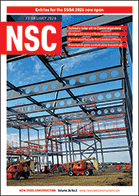News
President’s Column: Mom’s apple pie tomorrow?
Before the summer break, BCSA members were reporting improved optimism for the future, but unfortunately, the latest round of Regional Meetings have featured a widespread dip in confidence. Members are reporting a quiet summer, difficult trading conditions and little sign of growth in the immediate future. The total market for structural steel is likely to be circa 800,000t for 2025, which is the lowest figure since 2009, but is forecast to grow again in 2026. However, it was predicted that 2025 would be a growth year but instead we appear to be in a prolonged period of stagnation with the continual prospect of “jam tomorrow”. With so much now dependent on UK Government spending and client confidence, attention is now focussed on the Autumn Statement.
Members are experiencing difficulties with repeat pricing, programme slippage and a general reluctance to commit to projects. There are undoubtably fears in some sectors regarding changing technology and potential obsolescence, but there is also economic uncertainty due to the effects of one budget and the potential implications of the next. Continual speculation regarding likely tax rises coming down the line does not help anyone to plan for the future.
At previous BCSA AGMs, Roger Martin-Fagg has provided interesting insights into how the economy really works and whether Government policy has much overall impact. At the time, the Bank of England was trying to lower inflation by using its traditional method of increasing interest rates. This was likened to “trying to pull a brick along the ground with a rubber band”; nothing happens for ages and then you’re whacked in the side of the face. This prompted a question from the floor as to whether there was a more effective way of slowing an economy and the response was to “simply raise taxes”.
The tax rises from the last budget could already be providing a practical demonstration of this theory and we now have the danger that any additional tax rises will only further hinder growth. Another complication is that by increasing business costs, the tax rises themselves could be inflationary and many of our members are also voicing concerns regarding other cost pressures, such as the likely impact of future rises to the national minimum wage with a knock-on impact on all other pay grades.
Government investment in infrastructure will hopefully improve the mood with an eventual increased demand for structural steelwork and there have been several welcome strategy announcements. Potential growth areas include defence, airport expansion, electrification of the economy and the move to greener industry including the development of EAF steel production within the UK, but these are all in the longer term. Our members are primarily concerned with the immediate future and how to bridge their gaps in production. As an industry we account for over 100,000 jobs, use over half of all UK produced steel and operate nationally. Constructional steelwork is not only vital for building the future Britain, but creates real value today.
The recent US Presidential visit will hopefully unlock some valuable investment in the UK, particularly through the development of Data Centres and Small Modular Reactors. As always, it will take time for this money to filter through, but it does at least improve the outlook in the short to medium term. Unfortunately, for our steel producers, tariffs remain in place, but these are lower than others in the world and hopefully there is at least some certainty for the industry going forward.
The upcoming budget is causing concern to all in our industry with the fear that increases in taxation will only further hurt economic growth. There is a genuine need for greater economic activity in the short to medium term and the recent US investment announcements are very welcome but let’s hope that they are not just a case of “Mom’s apple pie tomorrow”.
Chris Durand
BCSA President



